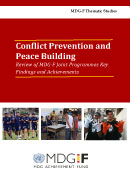

Conflict Prevention and Peacebuilding
 Eradicate Extreme Poverty and Hunger
Eradicate Extreme Poverty and Hunger
Violent conflict is often a symptom of deep rooted inequality and social exclusion.
The MDG-F's work addressed conflict both as a cause and symptom of poverty and hunger in the world. The 20 programmes worked on solutions to overcome conflicts by promoting access to justice, providing peaceful dispute resolution and legal mechanisms, forging intercultural dialogue and building a culture of peace. Innovative and integral approaches to citizen security reduced crime rates. Sports, arts and culture were used to channel youths' energy into building positive relations. A common aim across the programmes was ensuring that people know and exert their rights as an important component of a peace building and conflict prevention strategy.
In the Mexican State of Chiapas, where two decades of political violence has created a vast number of internally displaced people (IDPs), the MDG-F supported the drafting of the 'Protection Law for IDPs' and trained nearly 10,000 people to know their rights under the newly-adopted law. In Serbia, the MDG-F assisted in the resettling of IDPs and in the obtaining by 600 Roma of their first-ever ID cards, which give them access to public services. An anti-violence radio campaign reached more than half a million people in Haiti, still suffering in the aftermath of the 2011 earthquake. And in the Democratic Republic of the Congo's violent province of North Kivu, the programme assisted 70,000 returnees and victims of sexual violence to reintegrate into their communities and to equitably manage their livelihoods.
These efforts contributed to achieving MDG goals on eradicating extreme poverty, promoting gender equality and empowering women. 15% of the budget in this area was directed towards gender-related interventions.
RESULTS OF OUR WORK:
- 400,000 youth engaged in actions to build peace and prevent conflicts.
- 63,000 citizens accessed conflict resolution and reconciliation services.
- 78,000 people gained increased access to justice.
- 40 laws, policies and plans were put in place to build dialogue spaces for conflict resolution.
Click here for a complete report of the indicators and results achieved by the MDG-F’s 20 joint programmes on Conflict Prevention and Peace Building.
Success Stories

Analysis of key findings and achievements
This report captures the main achievements and experiences of the MDG-F’s programmes in this thematic window and presents their impact on the lives of communities across five regions. Prepared by an independent expert, the study is based on extensive desk reviews, interviews with selected joint programmes, and a thorough analysis and synthesis of inputs and contributions.
| Download Summary | Download Full Report |
|
Joint Programme Title
Country
MDG-F Programme Area
|
